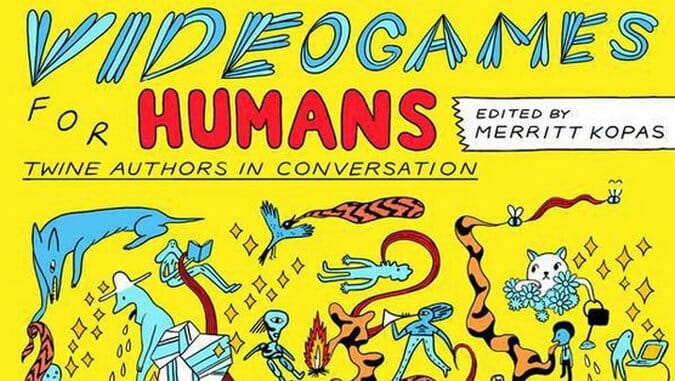Videogames For Humans edited by Merritt Kopas

Since its release in 2009, Twine, a free application created by Chris Kilmas, has had a substantial impact on game development, giving non-traditional and diverse creators the means to make unique, memorable text-based games without having to pay licensing fees or learn complex coding. What Merritt Kopas and company have created with this book is essentially a series of critical commentaries on various Twine games by different critics, most of whom have created Twine games themselves. The essays have a back and forth structure: a piece of the game is presented, and then the critic responds to that piece, critiquing it or relating to it in some fashion. The critic plays through the entire game like this. These chapters, due to the back and forth, often read like the author is having a conversation with the game, hence the collection’s subtitle: “Twine Authors in Conversation.”
While there is a helpful guide to understanding how to read these essays at the beginning of the book, I must admit that I had difficulty settling in to the book’s style, even though I have created and played a number of Twine games myself. This is mostly due to stylistic changes that occur from chapter to chapter; sometimes I had to take a second to stop and figure out whether it was the game “speaking” or the author presenting their commentary. Also, Videogames for Humans is not structured as an introduction to Twine games, so I can’t imagine someone who has no experience with playing a Twine game being able to dive into this book headfirst with little trouble. It’s a collection that demands a certain amount of experience with its subject, which is ultimately fine. As Kopas writes at the end of the introduction, “This is a book about Twine. But let’s not let it be the book, yeah?”
With that caveat in mind, I still think that Videogames for Humans contains invaluable criticism presented by thoughtful voices. Perhaps what’s most refreshing is how diverse these essays are in both subject and tone. Patricia Hernandez takes a distanced, analytical approach to critiquing Elizabeth Sampat’s Nineteen, a personal game about struggling with depression. Imogen Binnie’s take on Eva Problems’ Sabbat, a game concerned with witchcraft and sacrifice, is a wholly different animal. Binnie’s writing style is humorous and nuanced, with sentences sprinting across the page, rarely slowing down to take a breath:
There’s this assumption that if you stray from The Scientific Method into actually caring about things like lying on the floor of your room in the middle of the afternoon with black canvas hung over the curtains to keep the sun out with a single candle burning, wearing lipstick—even though you pretty much don’t wear lipstick any other time in your life—sort of meditating and sort of tripping off sensory deprivation and sort of falling asleep, that you had better take that weird stuff just as seriously and humorously as scientists are supposed to take science. Like basically magic can’t be weird or fun or fucked up or stupid on purpose. Which is wrong!
The number and quality of the essays here—27 in all—gives a strong idea about just how malleable Twine is as a game development tool. The collection covers humorous games (SABBAT), deeply personal confessions (scarfmemory, There Ought To Be a Word, I’m Fine), surreal poetry (Your Lover Has Turned into a Flock of Birds) and games resembling the Choose Your Own Adventure style of books that Edward Packard created in the early 80s (Horse Master, Depression Quest). I found each essay to be worth the time it took to read them, though some of the longer pieces, like Naomi Clark’s commentary on Horse Master, left me mentally exhausted. However, these longer essays don’t waste space on purposeless, idle thoughts. They just take a while to process and, in fact, deserve to be mulled over for a bit instead of being quickly digested and forgotten so you can get on to the next chapter.
My favorite essay from Videogames For Humans is Austin Walker’s piece on Jeremy Penner’s There Ought To Be A Word, a short work concerned with the awkward, sad aftermath of a divorce. Penner’s game is good and painful, painting a vivid picture of the frustrations that go along with trying to “get back out there” when you’re in the process of reassembling yourself. Walker does an exceptional job explaining why the game is special to him, both as someone who’s tried online dating and as a critic looking at its use of language and game design. He deftly mixes two styles of criticism that don’t often go together well, and it’s hard not to be impressed. Here’s an example; the following is from Penner’s game:
It’s actually going really well. We’re still really close. In fact, our relationship is better than it’s been in a long time.
We have a good plan in place for raising our son together. We eat meals together with him. We’ll do holidays together sometimes. He still has a family. That’s really important.